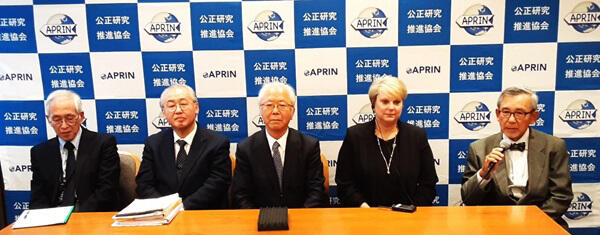The general incorporated Association for the Promotion of Research Integrity (APRIN) held its "FY2023 National Council for the Promotion of Research Integrity'' on January 26th at the Yasuda Auditorium of the University of Tokyo. The theme was generative AI in educational and research institutions. Professor Yutaka Matsuo of the University of Tokyo, the chair of the Cabinet Office's AI Strategy Council, and others delivered keynote speeches. An expert from the USA gave a special lecture on the issue of research security, which is currently being discussed in Europe and the USA.
A press conference was held after the meeting. Director Makoto Asashima of APRIN explained that more than 400 research institutions and approximately 800,000 researchers currently participate in and cooperate with the National Council for the Promotion of Research Integrity. He also said that, during the three years of the coronavirus pandemic, new issues regarding generative AI and research security have emerged, extending APRIN's role beyond the issue of research fraud.

At this conference, experts gave keynote speeches on generative AI, which is rapidly becoming popular. The rapid progress of generative AI, how researchers are dealing with it, and the current status of "AI research paper mills" (illegal mass production of research papers by AI) were introduced. He particularly emphasized that the significance of holding the meeting, saying that it was a good opportunity to think about how to promote sound research.
Executive Director Kotobu Nagai (APRIN), representing the science and engineering subcommittee, said how deeply impressed he was by the common understanding at this meeting that the impact of AI, including its impact on secondary education, was confirmed as very significant. He also expressed his acute awareness of the need to help researchers, engineers, administrative staff, universities, and others address their respective challenges and provide them with teaching materials.
He explained that he released AI teaching material for engineers last September and announced his intention to release introductory teaching material on AI not only for science majors but also for general researchers this year. He also plans to prepare further teaching material for research security purposes.
Attorney Yasushi Kodama from the Shinsei Sogo Law Office spoke of the fundamental nature of academia as the key point of his keynote speech. He pointed out that rapid evolution is occurring from government-funded academia to a science and technology sector raising funds from the financial markets. As the conceptualization of financial governance has a huge impact on the academic world, he was raising a question of whether a sound academic foundation can really be maintained.
In her special lecture, Associate Vice Chancellor Stacey Pritt, the Chief Research Compliance Officer at Texas A&M University, USA, who had learned that APRIN is addressing research security issues, highly praised its activities. Given the importance of research security in Europe and the USA, she noted that discussions are taking place on research-security partnerships between these two regions. Regarding this issue, she also emphasized the importance of ensuring continued international collaboration with other countries, including Japan. On the other hand, she said that researchers were about to be informed of what things need to be reported and disclosed and of their various obligations, such as complying with export control regulations.
According to Pritt, federal funding agencies are examining administrative measures regarding these issues. As various regulations will be formulated and it will take years, many changing, and fluid elements are involved in addressing these issues. Executive Director Iekuni Ichikawa (APRIN) acknowledged the special lecturer, Pritt, highlighting her various titles and the breadth of her perspective in tackling research security issues.
In the applied research field, countermeasures have long been applied to the leakage of research data from companies and other organizations to (foreign) external parties. However, the problem of research security in national research institutions and universities (involving, e.g., the overseas leakage of research data in basic research fields) is a newly recognized problem yet to be clearly defined. Ichikawa expressed his thoughts that this challenge, common to both Japan and the USA, required further study in the future, noting that it was a source of great confusion for Japanese researchers.
This article has been translated by JST with permission from The Science News Ltd. (https://sci-news.co.jp/). Unauthorized reproduction of the article and photographs is prohibited.




